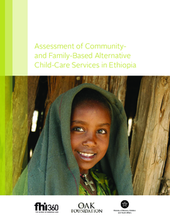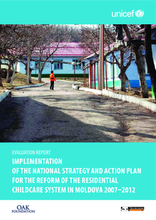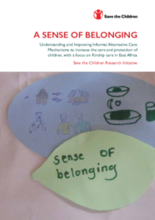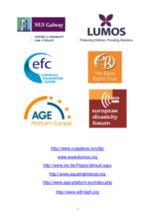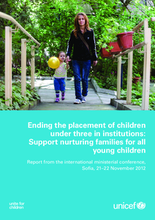Displaying 131 - 140 of 303
This assessment conducted by FHI 360, with support from Ethiopia's Ministry of Women, Youth and Children Affairs (MoWYCA) and the OAK Foundation aimed to generate evidence about formal community and family- based alternative child care services and service providing agencies in Ethiopia, with a particular focus on magnitude, quality and quality-assurance mechanisms.
This book by Dr. Xiaoyuan Shang and Karen Fisher provides a comprehensive and clear picture of the situation of children who are orphaned or abandoned in China. It introduces the context and framework for the alternative care system and China’s welfare system as it applies to children, and provides a profile of orphans and of care arrangements, describing both the formal child welfare system and the informal care system, particularly kinship care.
The Government of the Republic of Moldova launched its childcare reforms in 2006 aiming to establish a network of community social assistants, develop family support services and alternative family placement services, and reorganise residential childcare institutions. This evaluation reviews the implementation of the National Strategy and Action Plan for the Reform of the Residential Childcare System 2007–2012 approved by the Government of the Republic of Moldova in July 2007.
The main purpose of this final, summative evaluation is to evaluate the final results and achievements of the "Developing community based services for children with disabilities and their families’’ project in relation to the project log frame and theory of change.
This important study on foster care practices in India provides important insight into the history, approaches, challenges and opportunities facing the development of foster care services in the country, presenting a picture of foster care practices across nine Indian states.
The study examined alternative family and community care options and how they can be strengthened; cultural attitudes and perceptions of the communities and experiences of prospective foster and adoptive parents as regards reunification, kinship care, fostering and adoption.
The purpose of this research is to learn about community-based child protection processes and mechanisms in two refugee camps in Rwanda – Gihembe and Kiziba.
A report by Save the Children examining the role and extent of kinship care in West Central Africa, as well as looking into program and policy implications and gaps in advocacy.
This joint memo was issued by a group of European organizations to clearly state their belief that the draft language on community living in the proposed EU Structural Funds Regulations should be amended to enhance the effect and to better advance the rights of children, persons with disabilities, and older people.
This Report from the international ministerial conference, held in Sofia, 21–22 November 2012, entitled 'Ending the placement of children under three in institutions: support nurturing families for all young children', brings together the presentations, political commitments and priority actions identified by the participants, including 20 governments from Eastern Europe and Central Asia.

